Marketing Research of Vegan Restaurant
VerifiedAdded on 2022/08/12
|9
|1546
|11
AI Summary
Contribute Materials
Your contribution can guide someone’s learning journey. Share your
documents today.
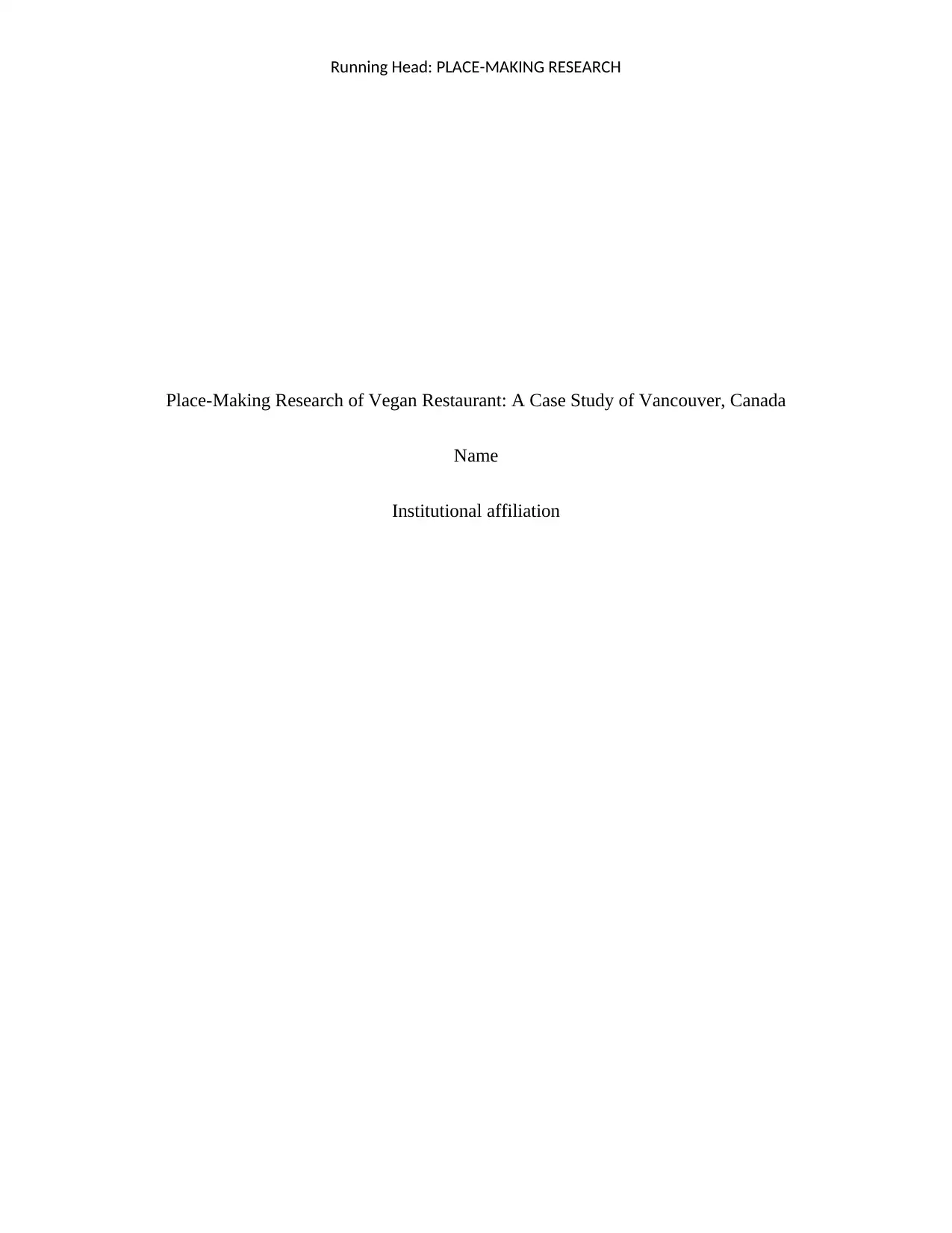
Running Head: PLACE-MAKING RESEARCH
Place-Making Research of Vegan Restaurant: A Case Study of Vancouver, Canada
Name
Institutional affiliation
Place-Making Research of Vegan Restaurant: A Case Study of Vancouver, Canada
Name
Institutional affiliation
Secure Best Marks with AI Grader
Need help grading? Try our AI Grader for instant feedback on your assignments.
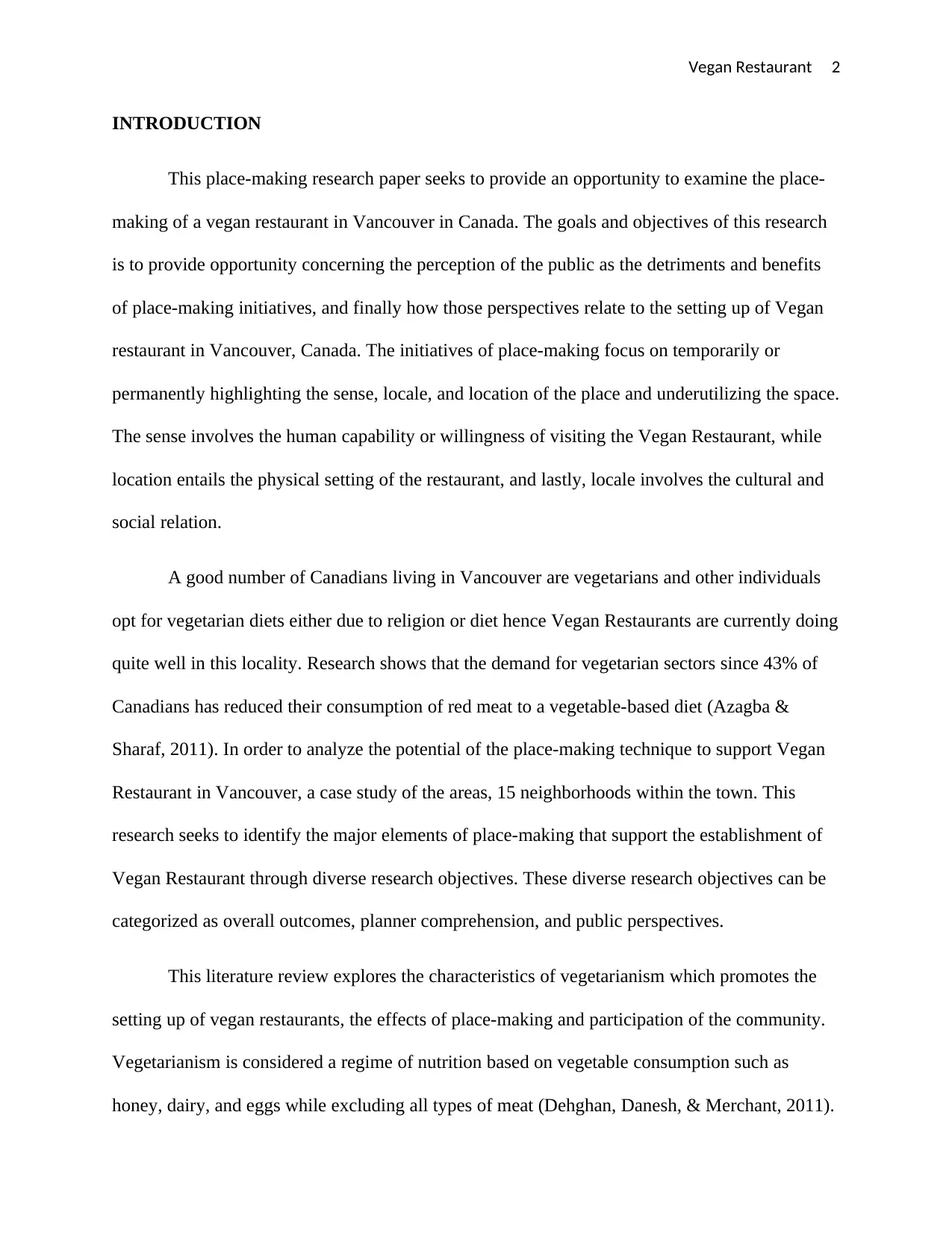
Vegan Restaurant 2
INTRODUCTION
This place-making research paper seeks to provide an opportunity to examine the place-
making of a vegan restaurant in Vancouver in Canada. The goals and objectives of this research
is to provide opportunity concerning the perception of the public as the detriments and benefits
of place-making initiatives, and finally how those perspectives relate to the setting up of Vegan
restaurant in Vancouver, Canada. The initiatives of place-making focus on temporarily or
permanently highlighting the sense, locale, and location of the place and underutilizing the space.
The sense involves the human capability or willingness of visiting the Vegan Restaurant, while
location entails the physical setting of the restaurant, and lastly, locale involves the cultural and
social relation.
A good number of Canadians living in Vancouver are vegetarians and other individuals
opt for vegetarian diets either due to religion or diet hence Vegan Restaurants are currently doing
quite well in this locality. Research shows that the demand for vegetarian sectors since 43% of
Canadians has reduced their consumption of red meat to a vegetable-based diet (Azagba &
Sharaf, 2011). In order to analyze the potential of the place-making technique to support Vegan
Restaurant in Vancouver, a case study of the areas, 15 neighborhoods within the town. This
research seeks to identify the major elements of place-making that support the establishment of
Vegan Restaurant through diverse research objectives. These diverse research objectives can be
categorized as overall outcomes, planner comprehension, and public perspectives.
This literature review explores the characteristics of vegetarianism which promotes the
setting up of vegan restaurants, the effects of place-making and participation of the community.
Vegetarianism is considered a regime of nutrition based on vegetable consumption such as
honey, dairy, and eggs while excluding all types of meat (Dehghan, Danesh, & Merchant, 2011).
INTRODUCTION
This place-making research paper seeks to provide an opportunity to examine the place-
making of a vegan restaurant in Vancouver in Canada. The goals and objectives of this research
is to provide opportunity concerning the perception of the public as the detriments and benefits
of place-making initiatives, and finally how those perspectives relate to the setting up of Vegan
restaurant in Vancouver, Canada. The initiatives of place-making focus on temporarily or
permanently highlighting the sense, locale, and location of the place and underutilizing the space.
The sense involves the human capability or willingness of visiting the Vegan Restaurant, while
location entails the physical setting of the restaurant, and lastly, locale involves the cultural and
social relation.
A good number of Canadians living in Vancouver are vegetarians and other individuals
opt for vegetarian diets either due to religion or diet hence Vegan Restaurants are currently doing
quite well in this locality. Research shows that the demand for vegetarian sectors since 43% of
Canadians has reduced their consumption of red meat to a vegetable-based diet (Azagba &
Sharaf, 2011). In order to analyze the potential of the place-making technique to support Vegan
Restaurant in Vancouver, a case study of the areas, 15 neighborhoods within the town. This
research seeks to identify the major elements of place-making that support the establishment of
Vegan Restaurant through diverse research objectives. These diverse research objectives can be
categorized as overall outcomes, planner comprehension, and public perspectives.
This literature review explores the characteristics of vegetarianism which promotes the
setting up of vegan restaurants, the effects of place-making and participation of the community.
Vegetarianism is considered a regime of nutrition based on vegetable consumption such as
honey, dairy, and eggs while excluding all types of meat (Dehghan, Danesh, & Merchant, 2011).
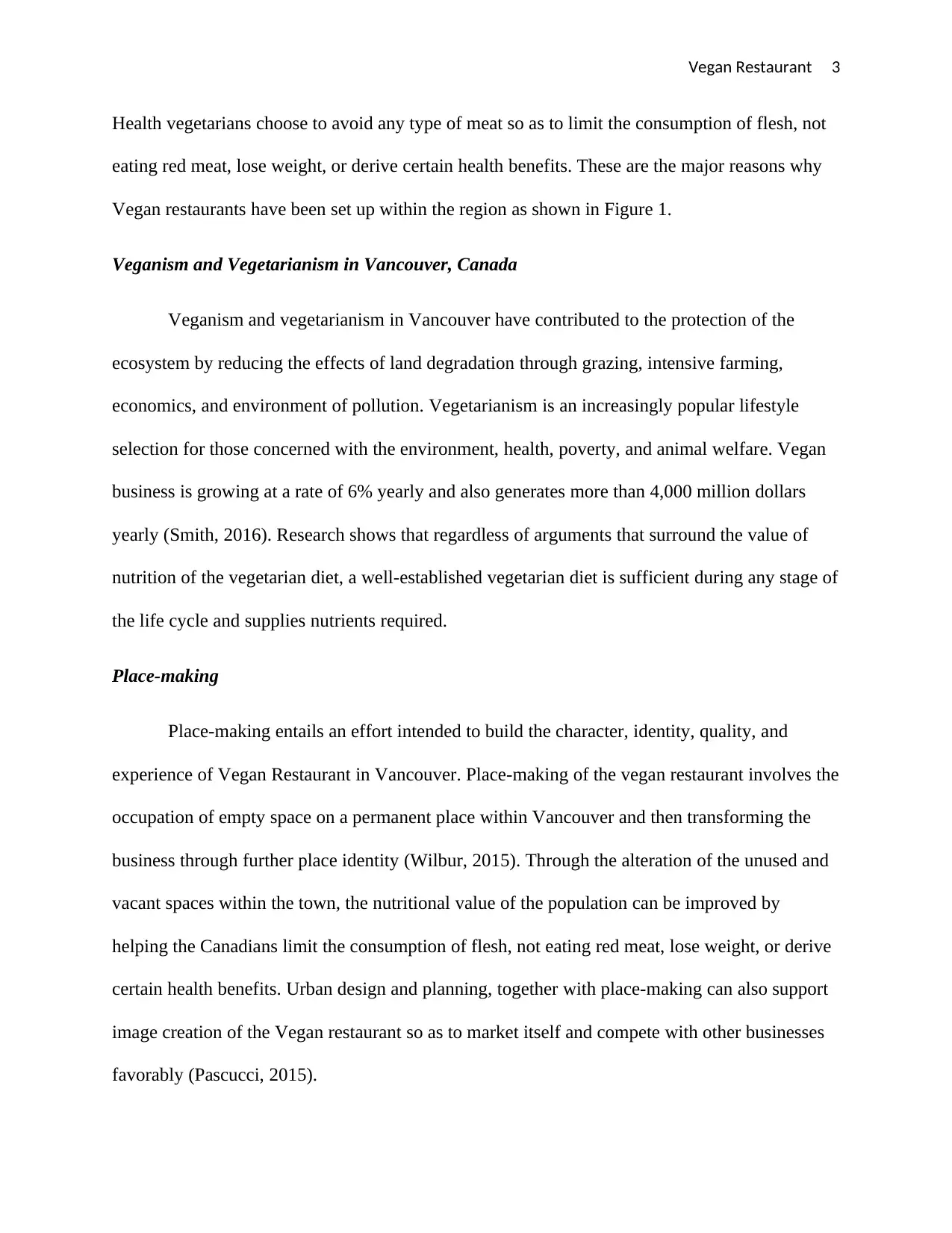
Vegan Restaurant 3
Health vegetarians choose to avoid any type of meat so as to limit the consumption of flesh, not
eating red meat, lose weight, or derive certain health benefits. These are the major reasons why
Vegan restaurants have been set up within the region as shown in Figure 1.
Veganism and Vegetarianism in Vancouver, Canada
Veganism and vegetarianism in Vancouver have contributed to the protection of the
ecosystem by reducing the effects of land degradation through grazing, intensive farming,
economics, and environment of pollution. Vegetarianism is an increasingly popular lifestyle
selection for those concerned with the environment, health, poverty, and animal welfare. Vegan
business is growing at a rate of 6% yearly and also generates more than 4,000 million dollars
yearly (Smith, 2016). Research shows that regardless of arguments that surround the value of
nutrition of the vegetarian diet, a well-established vegetarian diet is sufficient during any stage of
the life cycle and supplies nutrients required.
Place-making
Place-making entails an effort intended to build the character, identity, quality, and
experience of Vegan Restaurant in Vancouver. Place-making of the vegan restaurant involves the
occupation of empty space on a permanent place within Vancouver and then transforming the
business through further place identity (Wilbur, 2015). Through the alteration of the unused and
vacant spaces within the town, the nutritional value of the population can be improved by
helping the Canadians limit the consumption of flesh, not eating red meat, lose weight, or derive
certain health benefits. Urban design and planning, together with place-making can also support
image creation of the Vegan restaurant so as to market itself and compete with other businesses
favorably (Pascucci, 2015).
Health vegetarians choose to avoid any type of meat so as to limit the consumption of flesh, not
eating red meat, lose weight, or derive certain health benefits. These are the major reasons why
Vegan restaurants have been set up within the region as shown in Figure 1.
Veganism and Vegetarianism in Vancouver, Canada
Veganism and vegetarianism in Vancouver have contributed to the protection of the
ecosystem by reducing the effects of land degradation through grazing, intensive farming,
economics, and environment of pollution. Vegetarianism is an increasingly popular lifestyle
selection for those concerned with the environment, health, poverty, and animal welfare. Vegan
business is growing at a rate of 6% yearly and also generates more than 4,000 million dollars
yearly (Smith, 2016). Research shows that regardless of arguments that surround the value of
nutrition of the vegetarian diet, a well-established vegetarian diet is sufficient during any stage of
the life cycle and supplies nutrients required.
Place-making
Place-making entails an effort intended to build the character, identity, quality, and
experience of Vegan Restaurant in Vancouver. Place-making of the vegan restaurant involves the
occupation of empty space on a permanent place within Vancouver and then transforming the
business through further place identity (Wilbur, 2015). Through the alteration of the unused and
vacant spaces within the town, the nutritional value of the population can be improved by
helping the Canadians limit the consumption of flesh, not eating red meat, lose weight, or derive
certain health benefits. Urban design and planning, together with place-making can also support
image creation of the Vegan restaurant so as to market itself and compete with other businesses
favorably (Pascucci, 2015).
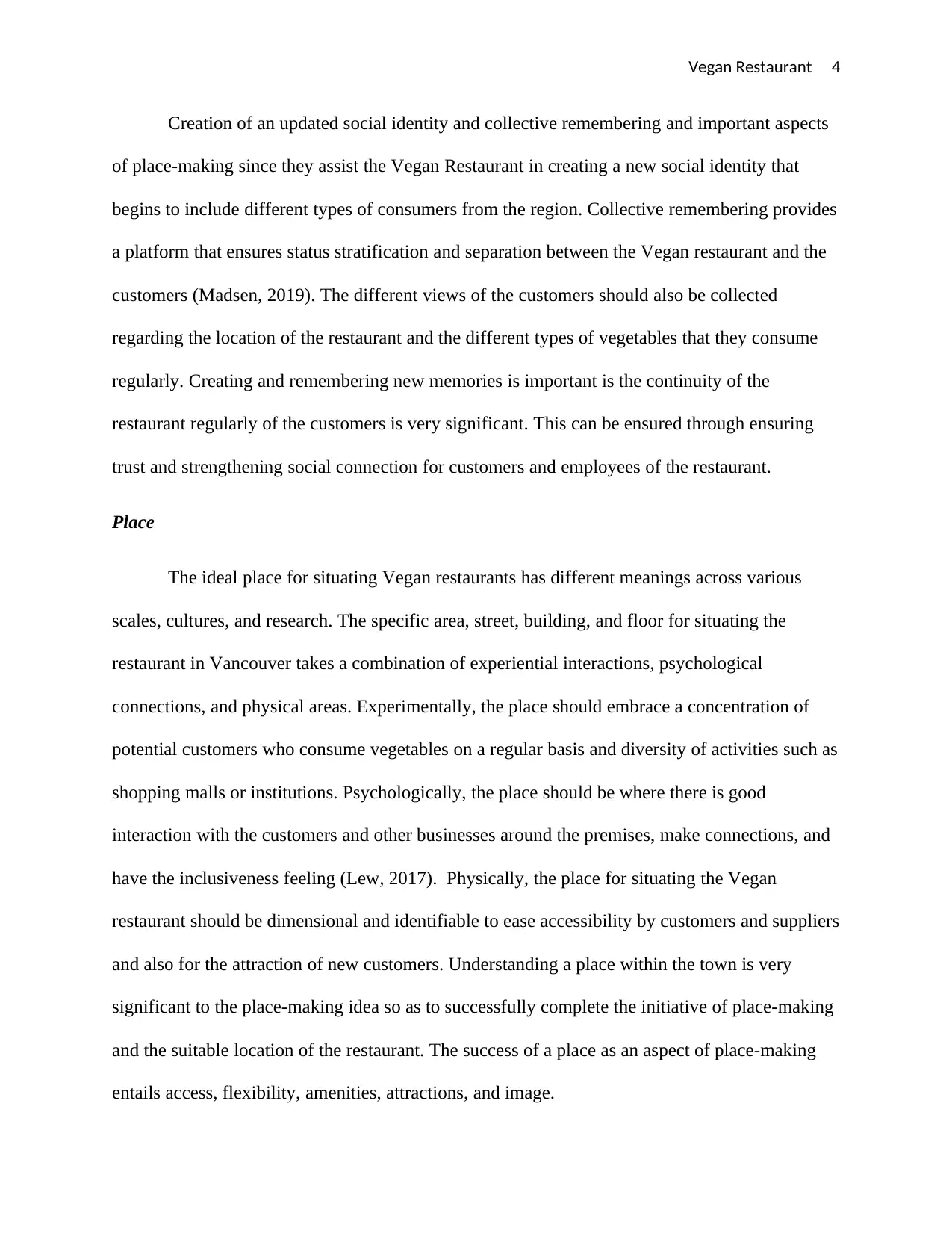
Vegan Restaurant 4
Creation of an updated social identity and collective remembering and important aspects
of place-making since they assist the Vegan Restaurant in creating a new social identity that
begins to include different types of consumers from the region. Collective remembering provides
a platform that ensures status stratification and separation between the Vegan restaurant and the
customers (Madsen, 2019). The different views of the customers should also be collected
regarding the location of the restaurant and the different types of vegetables that they consume
regularly. Creating and remembering new memories is important is the continuity of the
restaurant regularly of the customers is very significant. This can be ensured through ensuring
trust and strengthening social connection for customers and employees of the restaurant.
Place
The ideal place for situating Vegan restaurants has different meanings across various
scales, cultures, and research. The specific area, street, building, and floor for situating the
restaurant in Vancouver takes a combination of experiential interactions, psychological
connections, and physical areas. Experimentally, the place should embrace a concentration of
potential customers who consume vegetables on a regular basis and diversity of activities such as
shopping malls or institutions. Psychologically, the place should be where there is good
interaction with the customers and other businesses around the premises, make connections, and
have the inclusiveness feeling (Lew, 2017). Physically, the place for situating the Vegan
restaurant should be dimensional and identifiable to ease accessibility by customers and suppliers
and also for the attraction of new customers. Understanding a place within the town is very
significant to the place-making idea so as to successfully complete the initiative of place-making
and the suitable location of the restaurant. The success of a place as an aspect of place-making
entails access, flexibility, amenities, attractions, and image.
Creation of an updated social identity and collective remembering and important aspects
of place-making since they assist the Vegan Restaurant in creating a new social identity that
begins to include different types of consumers from the region. Collective remembering provides
a platform that ensures status stratification and separation between the Vegan restaurant and the
customers (Madsen, 2019). The different views of the customers should also be collected
regarding the location of the restaurant and the different types of vegetables that they consume
regularly. Creating and remembering new memories is important is the continuity of the
restaurant regularly of the customers is very significant. This can be ensured through ensuring
trust and strengthening social connection for customers and employees of the restaurant.
Place
The ideal place for situating Vegan restaurants has different meanings across various
scales, cultures, and research. The specific area, street, building, and floor for situating the
restaurant in Vancouver takes a combination of experiential interactions, psychological
connections, and physical areas. Experimentally, the place should embrace a concentration of
potential customers who consume vegetables on a regular basis and diversity of activities such as
shopping malls or institutions. Psychologically, the place should be where there is good
interaction with the customers and other businesses around the premises, make connections, and
have the inclusiveness feeling (Lew, 2017). Physically, the place for situating the Vegan
restaurant should be dimensional and identifiable to ease accessibility by customers and suppliers
and also for the attraction of new customers. Understanding a place within the town is very
significant to the place-making idea so as to successfully complete the initiative of place-making
and the suitable location of the restaurant. The success of a place as an aspect of place-making
entails access, flexibility, amenities, attractions, and image.
Secure Best Marks with AI Grader
Need help grading? Try our AI Grader for instant feedback on your assignments.
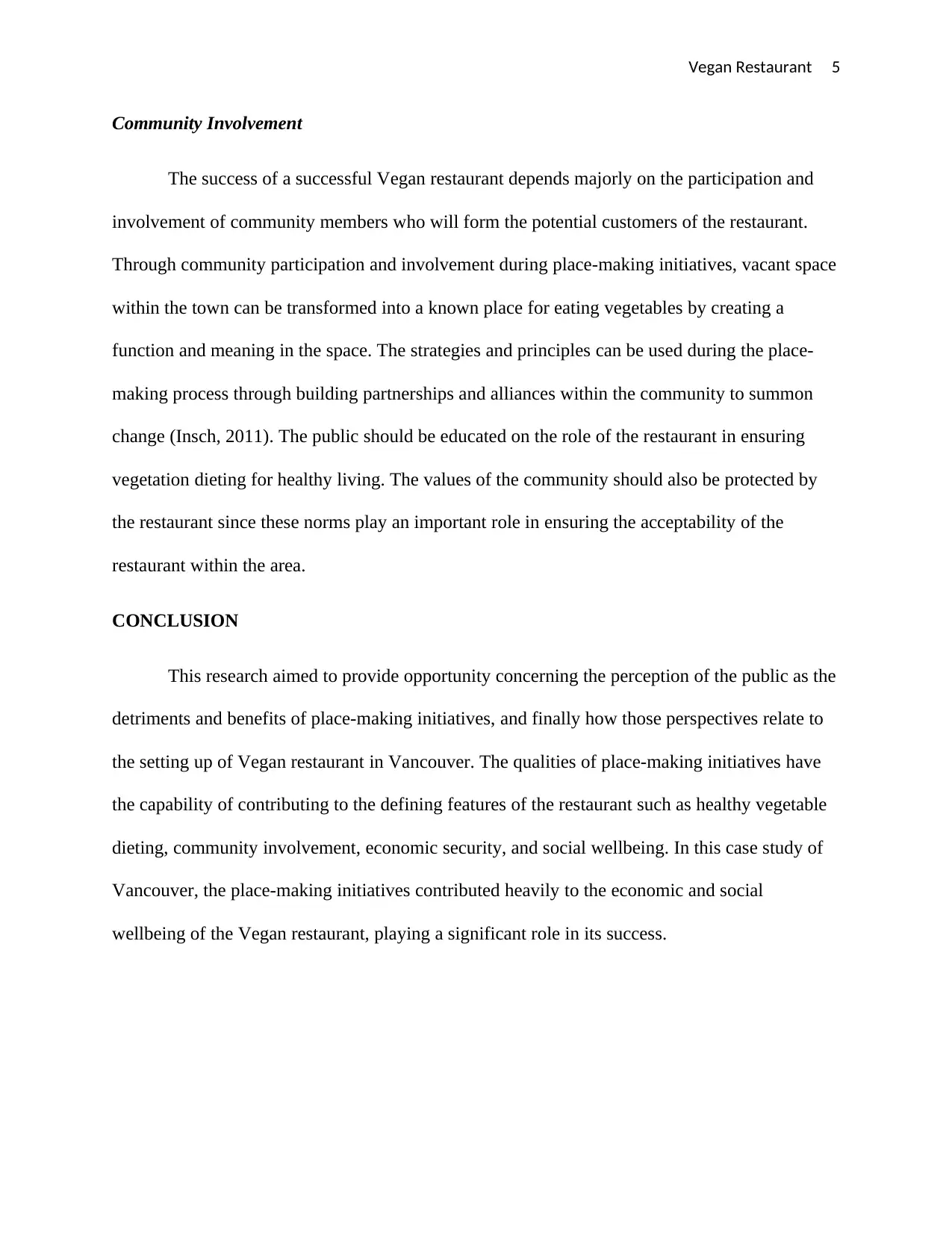
Vegan Restaurant 5
Community Involvement
The success of a successful Vegan restaurant depends majorly on the participation and
involvement of community members who will form the potential customers of the restaurant.
Through community participation and involvement during place-making initiatives, vacant space
within the town can be transformed into a known place for eating vegetables by creating a
function and meaning in the space. The strategies and principles can be used during the place-
making process through building partnerships and alliances within the community to summon
change (Insch, 2011). The public should be educated on the role of the restaurant in ensuring
vegetation dieting for healthy living. The values of the community should also be protected by
the restaurant since these norms play an important role in ensuring the acceptability of the
restaurant within the area.
CONCLUSION
This research aimed to provide opportunity concerning the perception of the public as the
detriments and benefits of place-making initiatives, and finally how those perspectives relate to
the setting up of Vegan restaurant in Vancouver. The qualities of place-making initiatives have
the capability of contributing to the defining features of the restaurant such as healthy vegetable
dieting, community involvement, economic security, and social wellbeing. In this case study of
Vancouver, the place-making initiatives contributed heavily to the economic and social
wellbeing of the Vegan restaurant, playing a significant role in its success.
Community Involvement
The success of a successful Vegan restaurant depends majorly on the participation and
involvement of community members who will form the potential customers of the restaurant.
Through community participation and involvement during place-making initiatives, vacant space
within the town can be transformed into a known place for eating vegetables by creating a
function and meaning in the space. The strategies and principles can be used during the place-
making process through building partnerships and alliances within the community to summon
change (Insch, 2011). The public should be educated on the role of the restaurant in ensuring
vegetation dieting for healthy living. The values of the community should also be protected by
the restaurant since these norms play an important role in ensuring the acceptability of the
restaurant within the area.
CONCLUSION
This research aimed to provide opportunity concerning the perception of the public as the
detriments and benefits of place-making initiatives, and finally how those perspectives relate to
the setting up of Vegan restaurant in Vancouver. The qualities of place-making initiatives have
the capability of contributing to the defining features of the restaurant such as healthy vegetable
dieting, community involvement, economic security, and social wellbeing. In this case study of
Vancouver, the place-making initiatives contributed heavily to the economic and social
wellbeing of the Vegan restaurant, playing a significant role in its success.
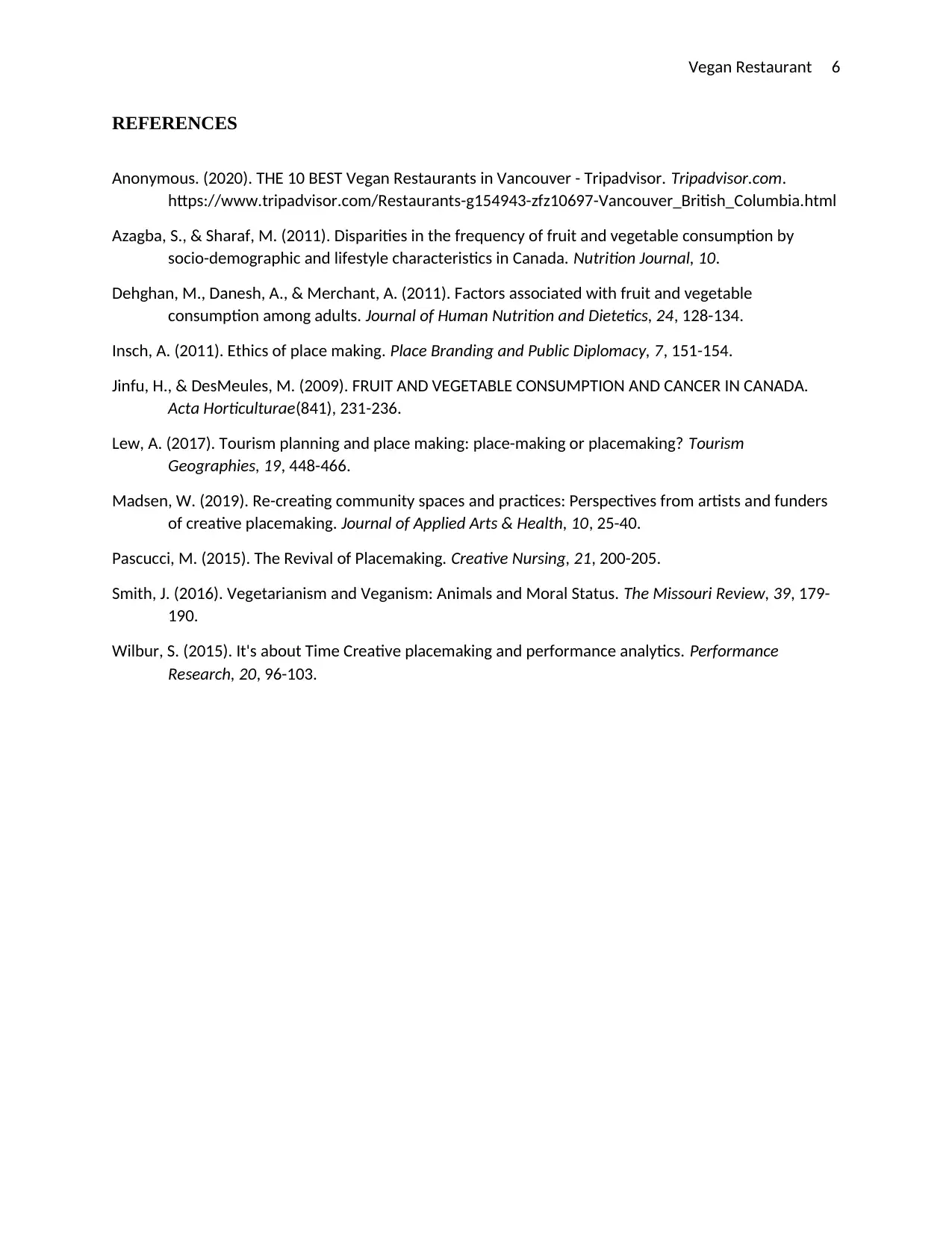
Vegan Restaurant 6
REFERENCES
Anonymous. (2020). THE 10 BEST Vegan Restaurants in Vancouver - Tripadvisor. Tripadvisor.com.
https://www.tripadvisor.com/Restaurants-g154943-zfz10697-Vancouver_British_Columbia.html
Azagba, S., & Sharaf, M. (2011). Disparities in the frequency of fruit and vegetable consumption by
socio-demographic and lifestyle characteristics in Canada. Nutrition Journal, 10.
Dehghan, M., Danesh, A., & Merchant, A. (2011). Factors associated with fruit and vegetable
consumption among adults. Journal of Human Nutrition and Dietetics, 24, 128-134.
Insch, A. (2011). Ethics of place making. Place Branding and Public Diplomacy, 7, 151-154.
Jinfu, H., & DesMeules, M. (2009). FRUIT AND VEGETABLE CONSUMPTION AND CANCER IN CANADA.
Acta Horticulturae(841), 231-236.
Lew, A. (2017). Tourism planning and place making: place-making or placemaking? Tourism
Geographies, 19, 448-466.
Madsen, W. (2019). Re-creating community spaces and practices: Perspectives from artists and funders
of creative placemaking. Journal of Applied Arts & Health, 10, 25-40.
Pascucci, M. (2015). The Revival of Placemaking. Creative Nursing, 21, 200-205.
Smith, J. (2016). Vegetarianism and Veganism: Animals and Moral Status. The Missouri Review, 39, 179-
190.
Wilbur, S. (2015). It's about Time Creative placemaking and performance analytics. Performance
Research, 20, 96-103.
REFERENCES
Anonymous. (2020). THE 10 BEST Vegan Restaurants in Vancouver - Tripadvisor. Tripadvisor.com.
https://www.tripadvisor.com/Restaurants-g154943-zfz10697-Vancouver_British_Columbia.html
Azagba, S., & Sharaf, M. (2011). Disparities in the frequency of fruit and vegetable consumption by
socio-demographic and lifestyle characteristics in Canada. Nutrition Journal, 10.
Dehghan, M., Danesh, A., & Merchant, A. (2011). Factors associated with fruit and vegetable
consumption among adults. Journal of Human Nutrition and Dietetics, 24, 128-134.
Insch, A. (2011). Ethics of place making. Place Branding and Public Diplomacy, 7, 151-154.
Jinfu, H., & DesMeules, M. (2009). FRUIT AND VEGETABLE CONSUMPTION AND CANCER IN CANADA.
Acta Horticulturae(841), 231-236.
Lew, A. (2017). Tourism planning and place making: place-making or placemaking? Tourism
Geographies, 19, 448-466.
Madsen, W. (2019). Re-creating community spaces and practices: Perspectives from artists and funders
of creative placemaking. Journal of Applied Arts & Health, 10, 25-40.
Pascucci, M. (2015). The Revival of Placemaking. Creative Nursing, 21, 200-205.
Smith, J. (2016). Vegetarianism and Veganism: Animals and Moral Status. The Missouri Review, 39, 179-
190.
Wilbur, S. (2015). It's about Time Creative placemaking and performance analytics. Performance
Research, 20, 96-103.
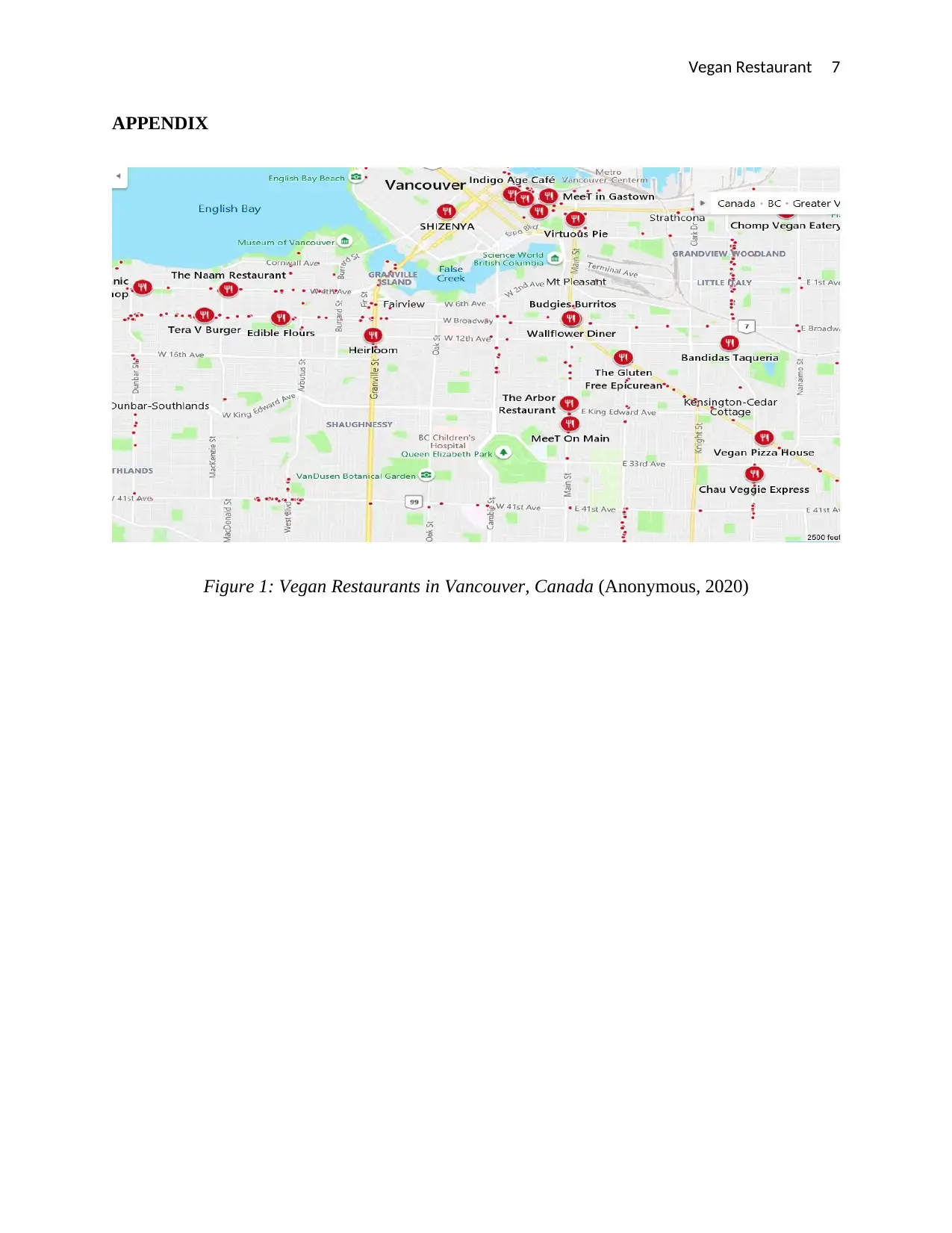
Vegan Restaurant 7
APPENDIX
Figure 1: Vegan Restaurants in Vancouver, Canada (Anonymous, 2020)
APPENDIX
Figure 1: Vegan Restaurants in Vancouver, Canada (Anonymous, 2020)
Paraphrase This Document
Need a fresh take? Get an instant paraphrase of this document with our AI Paraphraser
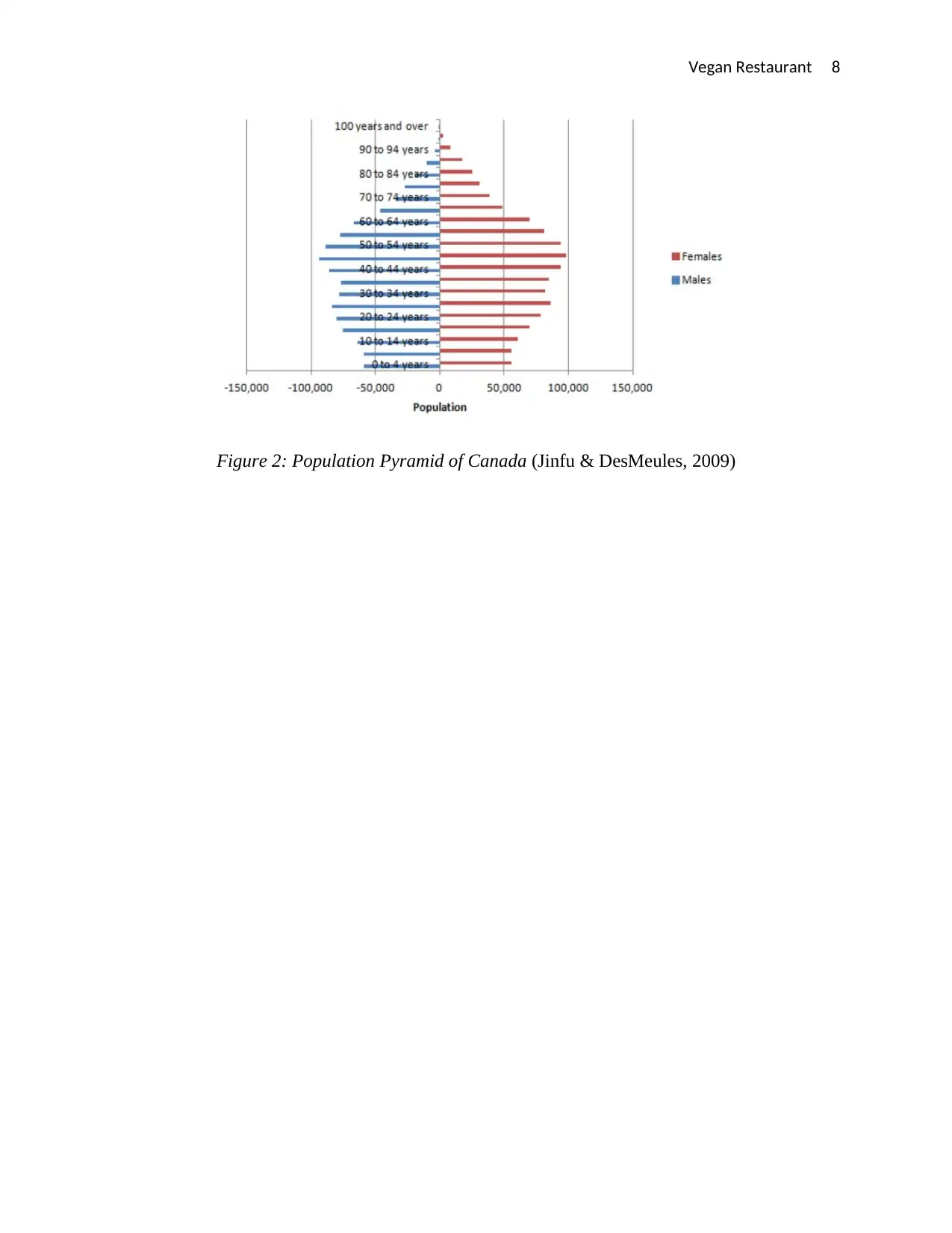
Vegan Restaurant 8
Figure 2: Population Pyramid of Canada (Jinfu & DesMeules, 2009)
Figure 2: Population Pyramid of Canada (Jinfu & DesMeules, 2009)
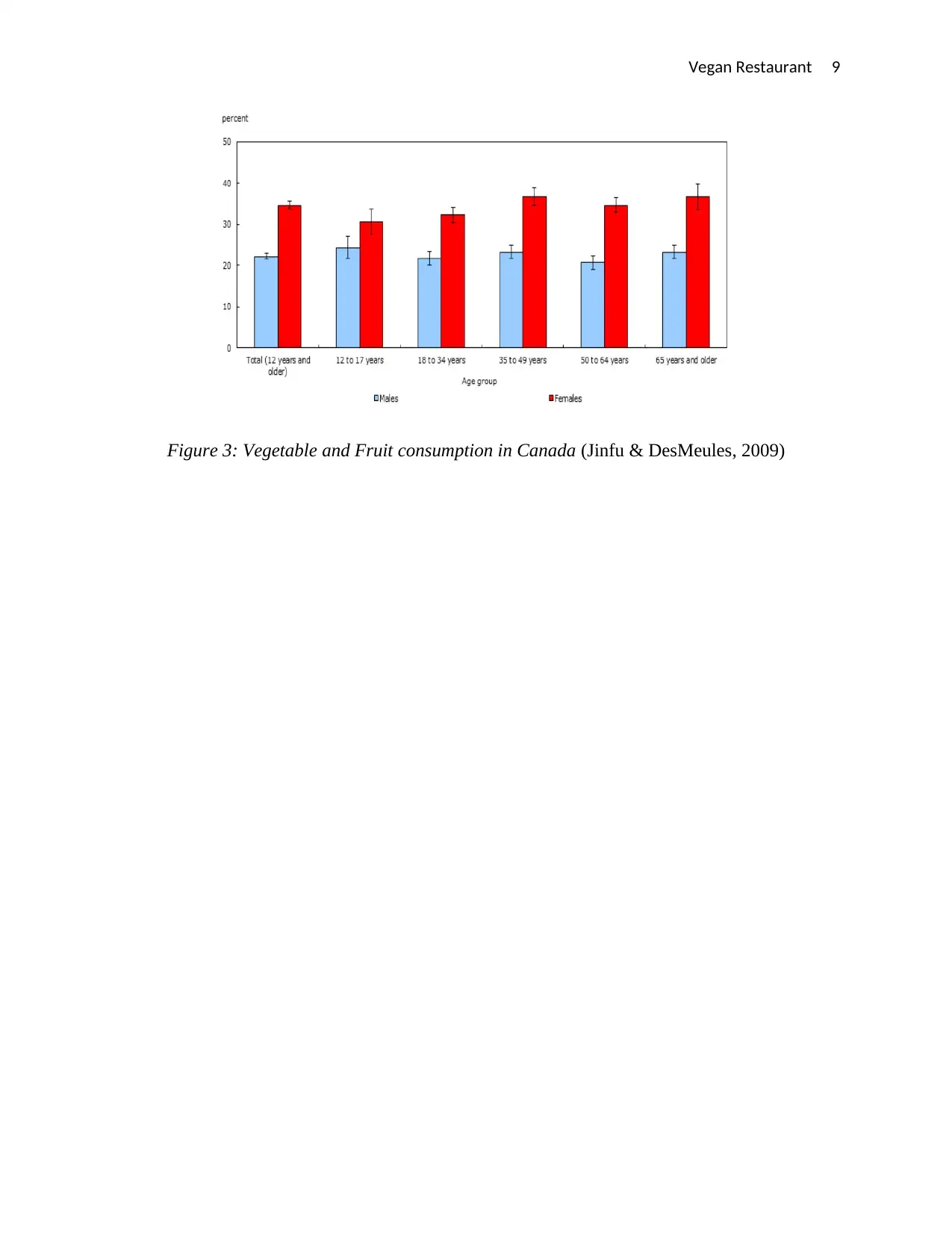
Vegan Restaurant 9
Figure 3: Vegetable and Fruit consumption in Canada (Jinfu & DesMeules, 2009)
Figure 3: Vegetable and Fruit consumption in Canada (Jinfu & DesMeules, 2009)
1 out of 9
Your All-in-One AI-Powered Toolkit for Academic Success.
+13062052269
info@desklib.com
Available 24*7 on WhatsApp / Email
![[object Object]](/_next/static/media/star-bottom.7253800d.svg)
Unlock your academic potential
© 2024 | Zucol Services PVT LTD | All rights reserved.
